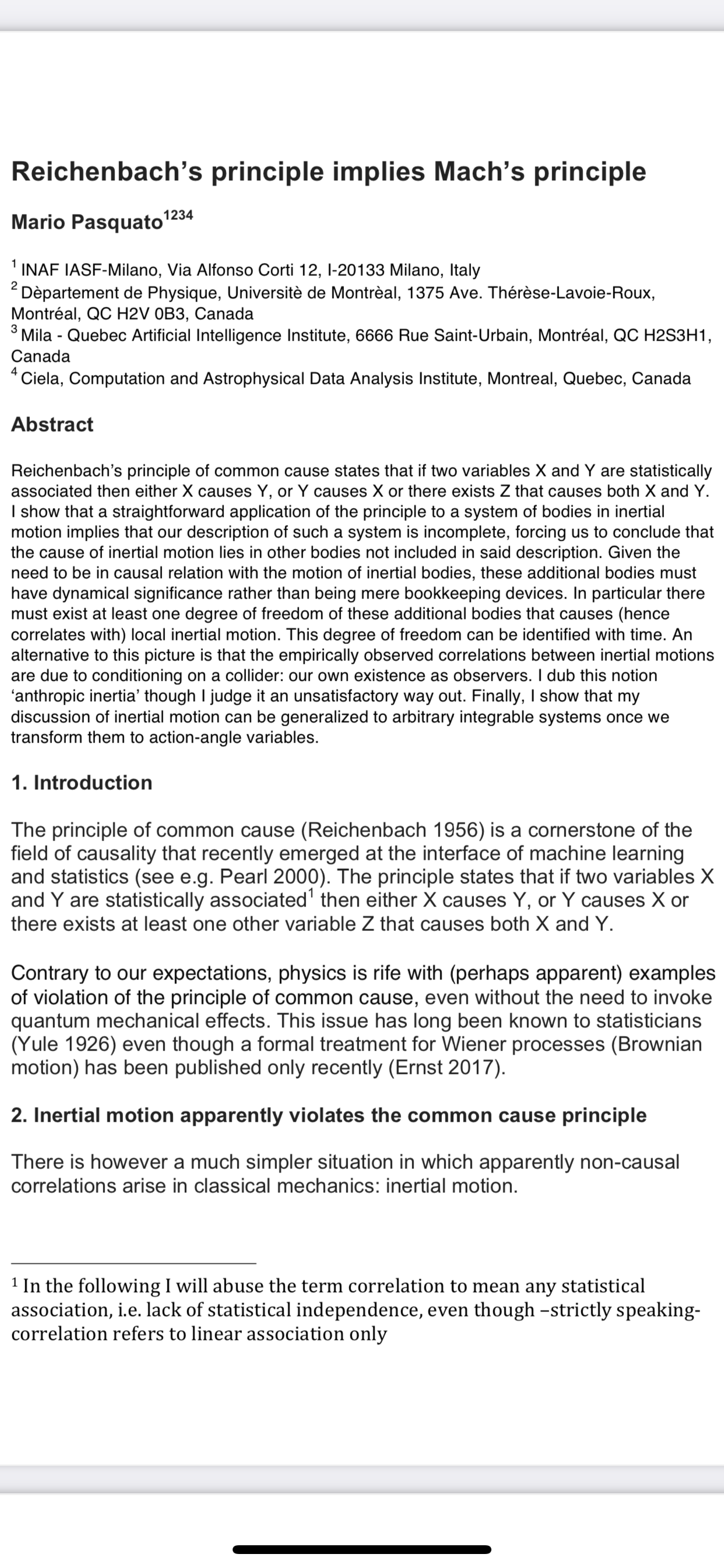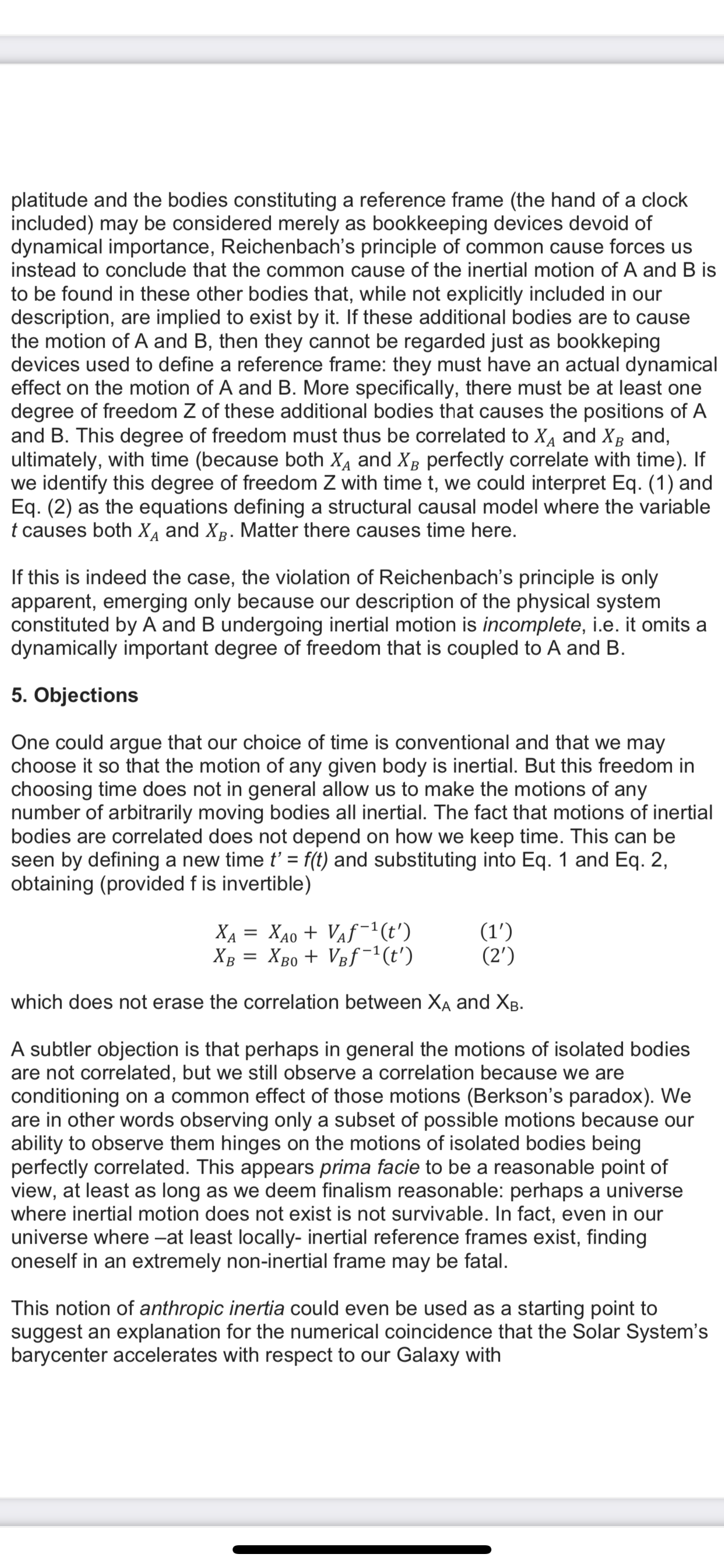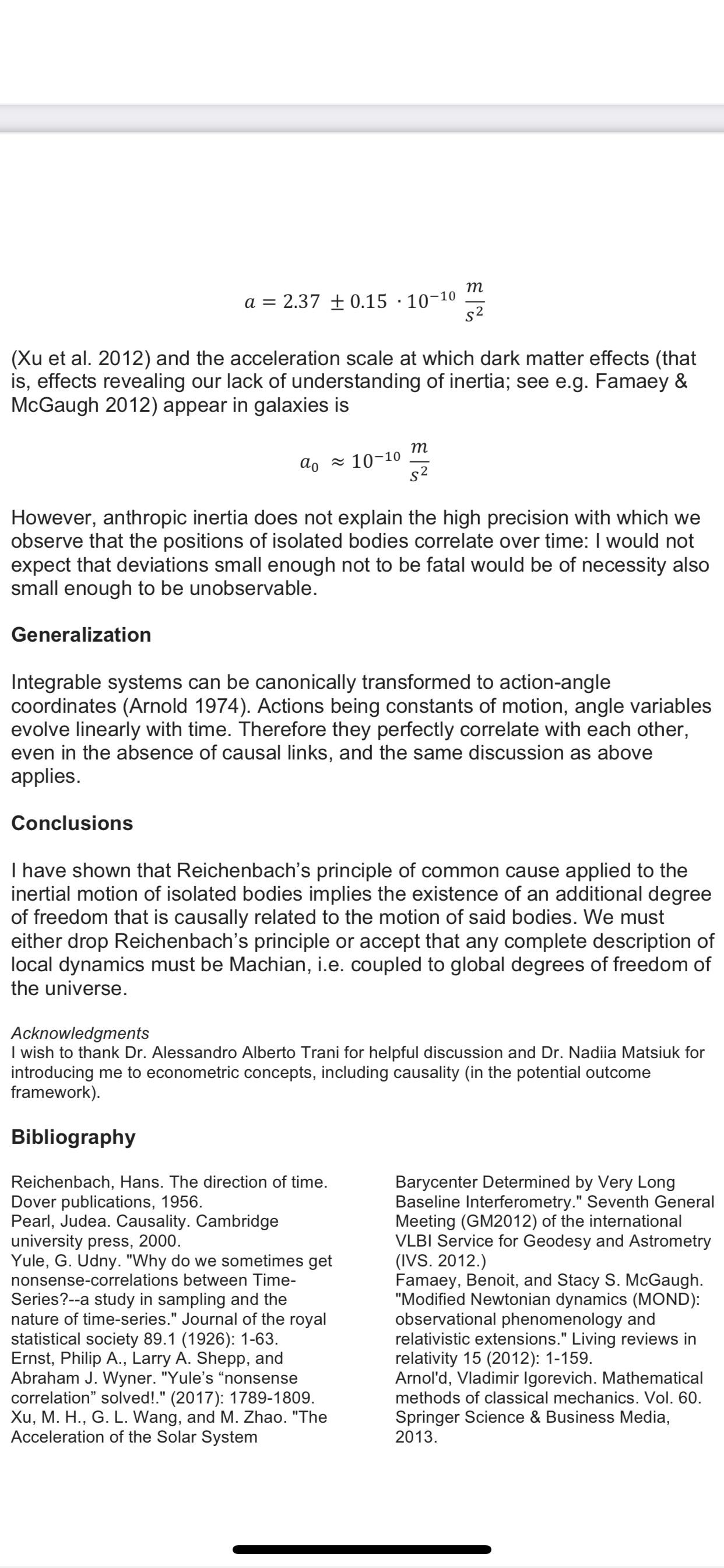
Yesterday I submitted for the first time in gr-qc. I got endorsed specifically for this, since I usually submit to astro-ph (I have about 70 papers on arxiv, mostly in astro-ph.ga some in astro-ph.co some in astro-ph.im and some even in nlin.CD).
My submission is (admittedly) somewhat crackpot: “Reichenbach’s principle implies Mach’s principle.” Some people shoot first and then ask questions when Mach’s principle is involved. Also the article is not formatted in a traditional way (Introduction, Methods, Results, Conclusions…). I concomitantly submitted to the journal Foundations of Physics, but I did not write that in the comments on the arxiv submission.
Here is the abstract if it may be helpful:
Reichenbach’s principle of common cause states that if two variables X and Y are statistically associated then either X causes Y, or Y causes X or there exists Z that causes both X and Y. I show that a straightforward application of the principle to a system of bodies in inertial motion implies that our description of such a system is incomplete, forcing us to conclude that the cause of inertial motion lies in other bodies not included in said description. Given the need to be in causal relation with the motion of inertial bodies, these additional bodies must have dynamical significance rather than being mere bookkeeping devices. In particular there must exist at least one degree of freedom of these additional bodies that causes (hence correlates with) local inertial motion. This degree of freedom can be identified with time. An alternative to this picture is that the empirically observed correlations between inertial motions are due to conditioning on a collider: our own existence as observers. I dub this notion ‘anthropic inertia’ though I judge it an unsatisfactory way out. Finally, I show that my discussion of inertial motion can be generalized to arbitrary integrable systems once we transform them to action-angle variables.
Edit: I added “submitted to Foundations of Physics” to the description. Meanwhile the preprint was declined by ResearchSquare (some obscure preprint server that I agreed to use upon submission to FoP). This is part of their email informing me of that:
Dear Dr. Mario Pasquato,
Thank you for your recent preprint submission "Reichenbach’s principle implies Mach’s principle" to Research Square. Unfortunately, our screeners have determined that the manuscript type or its content is not suitable for posting as a preprint on Research Square. Please note that this decision does not reflect the quality or importance of the work and is made on the basis of our editorial policies with respect to content type and screening.
People are also trading
@mariopasquato this seems to be a good disproof of Reichenbach masquerading as support for something which you haven't really explained or cited and would at any rate still remove any practical applications of Reichenbach's principle.
@Ramble Yes I might as well present it as “Reichenbach’s principle is not applicable to physical systems in which inertia plays a role”. Sad, because we are using causal discovery based on Reichenbach on astronomical data…
@Ramble On the other hand the problem with applying causal discovery to time series generated by physical systems can be solved by including time as a variable. You can consider it as a common confound to everything. This is non trivial imho. Whether you want to interpret the causal role of time in Machian terms makes no difference in what you actually do
@Ramble I have no idea, honestly. I need to collaborate with a hard core GR person on this. Technically speaking “common cause of X and Y” in the sense of Reichenbach is some variable Z such that X and Y become independent conditional on Z. This does not necessarily have to align with physical causation in terms of exchange of momentum or the like. But then what good is it to have two notions of causation that do not overlap?
@mariopasquato Alright, finally had the time to read through it. It looks... Fine? Like, you're using a weird notion of Mach's Principle, but the thing seems valid, if not sound. It's just uninteresting to me. Reichenbach's CCP is really, really easy to argue against, as per here. Like. It's incompatible with determinism, if we're suitably broad with what we mean by events. There are weaker CCPs to work with, nobody uses Reichenbach's these days.
@Najawin I see. Well if you are not planning to apply causal discovery based on Reichenbach’s principle to physical systems then it’s understandable that this is of little interest to you. On the other hand I am in the middle of doing this (writing grant applications with students and all) so it’s a matter of practical importance. Can you do causal discovery based on weaker principles?
@mariopasquato Well afaik it's just generally accepted that Reichenbach's principle is false in philphys, is the issue. That's why it's of little interest. As for the other formulations, I mean, you tell me if you think this one will work for you. (Sec 12.) And I believe everyone agrees that the Causal Markov Condition is true in some situations.
@Najawin What is it with academia that a whole discipline considers a principle to be false while a different one is building an entire field of research on it :-D
@Najawin I like sect. 12. It seems to be a good starting point for linking this stuff to thermodynamics (which in my opinion is inevitable). Nice
@mariopasquato I mean, my background is quantum foundations and I haven't heard many people talking about Reichenbach's Common Cause Principle there, lol. But it could just be different spheres?
@Najawin I was chatting with Rob Spekkens a month ago at PI, he’s in quantum foundations too, apparently they use it (implicitly? I didn’t really follow what they are doing over there, I am a humble astrophysicist)
@mariopasquato Oh, I left the field years ago. I still keep up with it, but couldn't hack it in academia. And again, could easily be a different spheres of the field thing.
Mach is always crackpot adjacent, yeah, but a lot of it depends on the specifics of the argument and the specific formulation of Mach's principle being used.
Might I also suggest https://philsci-archive.pitt.edu ?
@Najawin Thanks, I will give it a try. The formulation I am using is vague enough to smell of crackpot: local dynamics must be coupled to global degrees of freedom of the universe for the principle of common cause to hold when applied to the time series of the positions of inertial particles. Very speculative shit, bordering on the trivial once you get it.
Baez crackpot index:
A -5 point starting credit.
1 point for every statement that is widely agreed on to be false. / 0 (to the best of my knowledge obviously)
2 points for every statement that is clearly vacuous. / 4 (2 points for “coupling to a global degree of freedom”, 2 for relating anthropic inertia to the acceleration scale of the Solar System in the Galaxy and MOND’s a0)
3 points for every statement that is logically inconsistent. / 0 to the best of my knowledge
5 points for each such statement that is adhered to despite careful correction. / 0 since no one corrected me yet
5 points for using a thought experiment that contradicts the results of a widely accepted real experiment. / 0 no thought experiments in my work
5 points for each word in all capital letters (except for those with defective keyboards). / 0
5 points for each mention of "Einstien", "Hawkins" or "Feynmann". / 0 (not even with the correct spellings)
10 points for each claim that quantum mechanics is fundamentally misguided (without good evidence). / 0 I don’t discuss QM
10 points for pointing out that you have gone to school, as if this were evidence of sanity. / 0
10 points for beginning the description of your theory by saying how long you have been working on it. (10 more for emphasizing that you worked on your own.) / 0
10 points for mailing your theory to someone you don't know personally and asking them not to tell anyone else about it, for fear that your ideas will be stolen. / 0
10 points for offering prize money to anyone who proves and/or finds any flaws in your theory. / 0
10 points for each new term you invent and use without properly defining it. / 0 (I believe I properly defined the concept of anthropic inertia)
10 points for each statement along the lines of "I'm not good at math, but my theory is conceptually right, so all I need is for someone to express it in terms of equations". / 0 (I am good at math)
10 points for arguing that a current well-established theory is "only a theory", as if this were somehow a point against it. / 0
10 points for arguing that while a current well-established theory predicts phenomena correctly, it doesn't explain "why" they occur, or fails to provide a "mechanism". / ? on the fence for this one; even though I make no such claim I am indeed looking at the why of inertial motion, let’s say 5 points
10 points for each favorable comparison of yourself to Einstein, or claim that special or general relativity are fundamentally misguided (without good evidence). / I call dark matter “evidence that we don’t understand inertia” does this count? Let’s say 5 points
10 points for claiming that your work is on the cutting edge of a "paradigm shift". / 0 I am not claiming that
20 points for emailing me and complaining about the crackpot index. (E.g., saying that it "suppresses original thinkers" or saying that I misspelled "Einstein" in item 8.) / 0
20 points for suggesting that you deserve a Nobel prize. / 0
20 points for each favorable comparison of yourself to Newton or claim that classical mechanics is fundamentally misguided (without good evidence). / 0
20 points for every use of science fiction works or myths as if they were fact. / 0
20 points for defending yourself by bringing up (real or imagined) ridicule accorded to your past theories. / 0
20 points for naming something after yourself. (E.g., talking about the "The Evans Field Equation" when your name happens to be Evans.) / 0
20 points for talking about how great your theory is, but never actually explaining it. / 0
20 points for each use of the phrase "hidebound reactionary". / 0
20 points for each use of the phrase "self-appointed defender of the orthodoxy". / 0
30 points for suggesting that a famous figure secretly disbelieved in a theory which he or she publicly supported. (E.g., that Feynman was a closet opponent of special relativity, as deduced by reading between the lines in his freshman physics textbooks.) / 0
30 points for suggesting that Einstein, in his later years, was groping his way towards the ideas you now advocate. / 0
30 points for claiming that your theories were developed by an extraterrestrial civilization (without good evidence). / 0
30 points for allusions to a delay in your work while you spent time in an asylum, or references to the psychiatrist who tried to talk you out of your theory. / 0
40 points for comparing those who argue against your ideas to Nazis, stormtroopers, or brownshirts. / 0
40 points for claiming that the "scientific establishment" is engaged in a "conspiracy" to prevent your work from gaining its well-deserved fame, or suchlike. / 0
40 points for comparing yourself to Galileo, suggesting that a modern-day Inquisition is hard at work on your case, and so on. / 0
40 points for claiming that when your theory is finally appreciated, present-day science will be seen for the sham it truly is. (30 more points for fantasizing about show trials in which scientists who mocked your theories will be forced to recant.) / 0
50 points for claiming you have a revolutionary theory but giving no concrete testable predictions. / 0
The result is… -5 + 4 + 5 + 5 = 9 (I told you I was good at math /s)
@mariopasquato 'I call dark matter “evidence that we don’t understand inertia”'
To be fair, this is very funny.
@mariopasquato Oh wow, I've been gone for ages. Just a quick sanity check for me, since I figured you might have some thoughts. The Platonic Representation Hypothesis is like totally a misnomer, right? It's far closer to what Carnap was doing imo, or the structuralist approaches since him. Or is this crackpottery on my part? (I'm actually disappointed to find so little engagement with OSR/ESR/ISR from the AI people interested in this, and vice versa. Seems to me to be exactly where a dialogue should be happening.)




